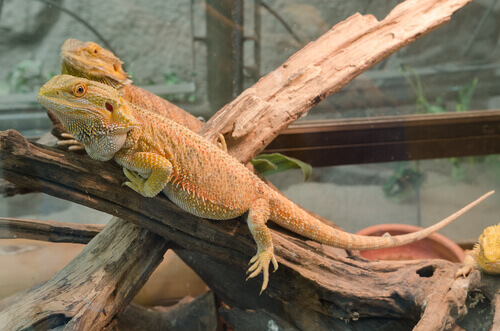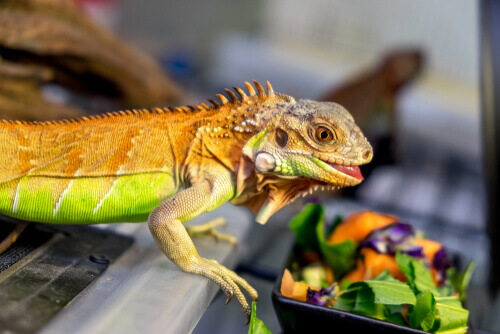Five Basic Things to Know about Iguana Care

It’s normal to have lots of questions when adopting an exotic pet. An iguana, for example, is still a mystery to many people. Today’s article will provide some information about it so continue reading and find out some basic things you should know about iguana care.
Can you have an iguana as a pet?
Yes and no. Huh? Well, it all depends on the laws of your country. Having an iguana as a pet was much easier a few years ago, but they’re now an endangered species and the legislation has changed in many places.
Furthermore, iguanas are peculiar pets so don’t expect them to behave like a dog or a cat. Besides, they could turn aggressive under certain circumstances. All said, the following information will be of interest to you if you decide to have one.
Basic things to know about iguana care
The right environment
The temperature is one of the most important things to consider when keeping an iguana as a pet. They need enough ultraviolet B spectrum lighting as it provides vitamin D. In addition, it helps them absorb calcium and other nutrients they need.

Indeed this light should cover the whole terrarium, so place one right over the place where the animal spends more time sleeping. As far as the terrarium is concerned, make sure it’s large enough for the iguana to lie down and turn around.
Did you know that heat is important for iguana care?
Iguanas are cold-blooded animals even though they’re usually from tropical climates. This is why they need an external heat source to regulate their body temperature. Thus, a terrarium should maintain an average temperature of 86ºF during the day and about 77ºF at night.
Artificial lights and heat cannot replace the sun, so place the terrarium in a sunny area. The temperature should be around 95 degrees if the iguana is a hatchling. Also, the lights should be turned off at night so as to not disturb their sleep cycle.
Feeding
These animals seem rather fierce but they’re actually quite harmless as they’re vegetarians. Some people feed them cat food, but it isn’t suitable for them. This is because this type of food doesn’t provide them with the specific nutrients they need.

In addition, this type of food contains meat particles and these elements would only increase the proteins in an iguana’s body and lead to health problems.
Their diet must consist of raw fruits and vegetables. All in moderation, though, due to their sugar content; once a week is suggested. You can add iguana feed to supplement their diet, you can find it in any specialized store.
Supplements
Even if you provide them with the proper lighting, temperature, and food, your iguana might not receive all of the necessary nutrients. This is why you must consider a vitamin supplement designed specifically for iguanas and put an end to this problem. Keep in mind that you can’t give them vitamins for humans; many stores carry several specialized products for these animals.
Hygiene is important for iguana care
The iguana is a rather clean animal so you must wash their containers every time you put water and food in them. Also, you have to clean their terrarium at least once or twice a week. Don’t use strong cleaning products, a little dishwashing liquid and water should suffice.
The floor of the terrarium requires a substrate base and you also have to change it regularly to keep their environment fresh and clean.
Finally, follow these simple steps to enhance your iguana’s quality of life if you’ve decided to adopt one as a pet. Keep in mind that adopting any animal is an extra responsibility.
This text is provided for informational purposes only and does not replace consultation with a professional. If in doubt, consult your specialist.